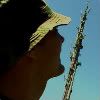BWE

Posts: 1902
Joined: Jan. 2006
|
| Quote (midwifetoad @ Mar. 01 2010,11:33) | | Quote | | In order for Penrose to make sense of reality, he needs consciousness to be tied to quantum effects, even if he has no direct empirical evidence supporting that. |
And in order for Behe to make sense of evolution he need mutation to be tied to the machinations of an invisible designer.
Where is Penrose's edge of consciousness? Does he have a cutoff beneath which consciousness does not exist? What's the cutoff? How many neurons are required for consciousness? |
Hi all. Penrose's hypothesis is not a structural argument. He's describing a problem he sees in constructing AI. Taking Hofstadter's premise, Penrose, in his own words:
| Quote | | "Mathematical truth is not something that we ascertain merely by use of an algorithm. I believe, also, that our consciousness is a crucial ingredient in our comprehension of mathematical truth. We must 'see' the truth of a mathematical argument to be convinced of its validity. This 'seeing' is the very essence of consciousness. It must be present whenever we perceive mathematical truth. When we convince ourselves of the validity of Gödel's theorem we not only 'see' it, but by so doing we reveal the very non-algorithmic nature of the 'seeing' process itself." |
-the emperor's new brain.
He isn't making the same argument TP is making. He's saying that the act of modeling in our mind, the part that computers seem to emulate relatively easily, is not the same product nor could it be the same process. He makes some efforts to tie it to neuroscience but ultimately his point is not relevant to human consciousness mechanics as much as it is to AI consciousness. The complication of the neural system is more than he addresses.
TP is taking the idea to a conclusion that seems obvious but is not warranted. At least Penrose doesn't go there. Also, the math Penrose is using to justify his hypothesis is just plain beyond most people. Even most physicists.
My original point with the OP was more like a response to Hofstadter than to Penrose. TP earlier claimed that not all modeling is algorithmic. Then claimed religion as a non algorithmic model.
Um.. Yes it is. The symbols are inputs with forces and manipulated over time.
I am not convinced that there is such a thing as a non algorithmic modeling process. The question Penrose raises has to do with whether our brains are actually modeling at their root or whether that is a process done as a result of a different process.
My question from the OP is whether science is a method analogous to Godel numbering new axioms.
--------------
Who said that ev'ry wish would be heard and answered
When wished on the morning star
Somebody thought of that, and someone believed it
Look what it's done so far
The Daily Wingnut
|


















